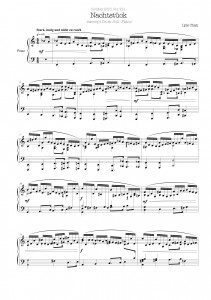This piece is a tribute to my friend Tom and the memory of our friendship. I met him in 1986 at a Roman Catholic church called St Paul’s in Madison, Wisconsin. Tom was the organist and I was the pianist. One of the first things Tom said to me was, “I don’t consider you a composer because you’re not published.” So I wrote him a very difficult organ piece, which he never played. Partly this was because it was unplayable, and partly it was because my manuscript, made with a calligraphy pen, was so ornate and fussy that the notation was unreadable.
Tom and I shared too much not to become friends. But in many ways we were nothing alike. We had in common our Catholicism, our music and physics – we were both studying for physics degrees, he for his Master’s and I for my Bachelor’s. But he loved applied physics and I loved theoretical physics. He loved organ music and I loved organ music that much less than most other classical music. He liked girls and I wasn’t yet openly gay.
But we had many friends in common at church, particularly in the choir, and to them Tom and I, their two sociable science–dorks cum keyboard wizzes, were perfectly matched. It was possible we became friends as much out of social expectations as from a genuine enjoyment of each other’s company. A girl from choir, Lisa, once commented that Tom and I did a good job of “looking out for each other.” I didn’t know how true Lisa’s remark would prove until, one spring when I needed a place to stay, Tom invited me to live with him. One night that spring I found I couldn’t understand anything Tom was saying. He was sitting up in bed, talking in perfectly–articulated words, yet making no sense. This was how I discovered Tom was manic–depressive. That night he was having a hypomanic episode.
The term ‘bipolar affective disorder’ was just then becoming known outside clinical circles. This was my first encounter with what people call mental illness. I soon learned that when it comes to mental illness, it’s ‘normal people’ who are irrational and out of touch with reality. My friendship with Tom became burdened by this secret because, ashamed and stigmatised, he didn’t want people to know.
I learned to respect Tom for the times when he wouldn’t take his medication. I knew it made him unable to have feelings properly. The ‘even keel’ that the lithium, anticonvulsants and other drugs gave him also made it impossible for him to truly experience emotions. He only felt in shallow, frustrating ways. Without the drugs, he was prone to disruptive antisocial behavior, but he was clearly more his natural self, his humanity intact if frightening for other people. The medication was for society’s sake rather than Tom’s.
Holding his secret, I became overprotective of Tom. It was obvious to those who knew. Once, we visited his family in Milwaukee. His mother treated me with a warmth that was uncomfortable both for me and her. As young as I was, I realized she was trying to share strength, to protect me, this boy who had taken over the caring of her difficult son. She probably understood everything, more than I did at the time. For a closeted gay teenager, I was in no position to master my emotions. Lines were blurry already enough, and caring for Tom made me fall a little in love with him.
Tom left Madison after receiving his Master’s degree. As soon as we didn’t live together anymore, we lost touch. It was almost sudden, as if not seeing each other everyday – after everything – was something we both recognized as a trigger to outgrow one another. But it wasn’t really so sudden. He’d spent nearly a whole summer away one year. That summer, I was becoming openly gay. Sexuality was something Tom and I never really talked about, except for his expressed desire to have a girlfriend, which he didn’t in the time we knew each other. As I became more comfortable about sexuality and Tom didn’t, it became yet another thing that we didn’t have in common.
Tom went on to have a somewhat hard life, with difficulties keeping down his beloved scientific research jobs despite having three college degrees. Once, he resorted to suing an employer for wrongful discharge, saying his bipolar disorder was a disability and the company failed in their duty to accommodate it. He lost the case. He is now a math teacher. I haven’t spoken to him in over 20 years.
My deep fascination with the human mind originated in my friendship with Tom. I coped and found support not through support groups but by taking increasingly advanced college courses in psychology alongside studying for my physics degree. I even worked as a research assistant in a biopsychology laboratory. I ended up inadvertently fulfilling all the ‘pre–med’ requirements, allowing me to attend medical school had I wanted to.
In one of the early classes, I had an assignment to write a case study of a historical figure. I chose Robert Schumann. I made a strong case arguing that the illness which killed Schumann, tertiary syphilis, was acquired during one of his hypomanic episodes. Schumann had bipolar disorder. Professor Terrie Moffitt, then not yet a famous criminologist, gave me an off-the-scale grade for having more than just textbook knowledge of bipolar disorder. Yes, that I did have.
I built Nachtstück on the Nachtstücke of Schumann, pieces that he would have called ‘Corpse Fantasy’ or ‘Funeral Fantasy’ had it not been for the counsel of his wife Clara, who suggested the less confronting title ‘Night Pieces’. Regardless, I think Schumann privately heard them as ‘Nightmare Pieces’. While composing them, Schumann was obsessed with the impending death of his brother Eduard. And yet if the listener isn’t told the background and doesn’t know the suppressed individual titles (Funeral Procession, Strange Company, and so on), these would be heard as beguiling, dramatic and indeed uplifting pieces of music. I wish the same for my Nachtstück – that knowing the story of Tom doesn’t mean this isn’t also a music of joy and thanksgiving.
I took the persistent martial rhythm in the left hand straight from the first Schumann Nachtstück. This is a very characteristic Schumann rhythm. He was able to conjure diverse moods with it; the contented opening of Kinderszenen sounds nothing like his Nachtstück, but is built on the identical rhythm. In this long first section, as well as in the brief fantasia–toccata passage which I fashioned from the third Nachtstück, I was initially surprised to find the unmistakable essence of Bach seeping through. But I needn’t have been – Schumann adored Bach, to the point of composing ‘accompaniments’ to the solo violin sonatas and partitas; Tom, like all organists, loved Bach too, and many nights after choir rehearsal, he and I would stay back and in that church he’s play me my first hearings of so much of Bach’s organ music.
I thought I felt the music slipping in and out of lucidity as I wrote it. Now that it’s reached its desired shape, I realize the music was never anything but lucid. I just had to understand it for what it was. For what it is. We are our everything. Tom’s brand of brilliance and creativity wouldn’t exist without his ‘illness’.
I can’t remember much about the organ piece I wrote Tom, except that it had a persistent martial rhythm. I don’t have a copy and I’m pretty sure Tom didn’t keep his either.
29 May 2010


